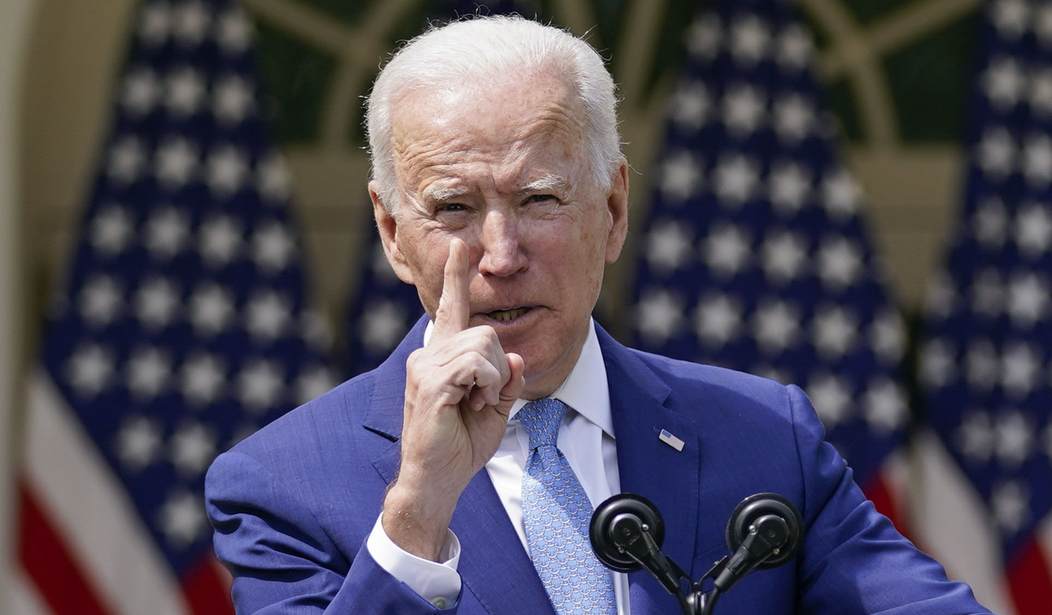On Thanksgiving, Joe Biden once again called on Congress to enact a gun ban, proclaiming that “the idea we still allow semi-automatic weapons to be purchased is sick.” Biden further declared that semi-automatic firearms have “no socially redeeming value, and the claimed that the only reason why they’re sold is the “profit for the gun manufacturers.”
As my colleague Tom Knighton pointed out in his coverage of Biden’s remarks, the president seemingly conflated “semi-automatic firearm” with “assault weapon”; an invented term that generally refers to semi-automatic rifles but not all semi-automatic firearms. I’m not convinced, however, that this was an actual mistake on the part of Biden, despite his long history of mangling his public comments to the point they’re incomprehensible. No, in this case I suspect that Biden intentionally spoke about wanting to ban semi-automatic firearms because that is, in fact, what he wants to do.
Now, there’s no way that Congress is going to pass Biden’s gun ban, even in the lame duck session. There aren’t 60 votes to ban so-called assault weapons, much less the much broader universe of the hundreds of millions of semi-automatic handguns, rifles, and shotguns in the hands of peaceable gun owners. But what if Joe Biden isn’t planning on signing a gun ban bill, but instead abusing his executive authority to impose a sweeping gun ban through regulation instead?
It sounds crazy, but for months now the gun control lobby has been advocating for the administration to take that step, maintaining in court filings and advocacy pieces that semi-automatic firearms are “readily converted” to fully-automatic fire and should therefore be treated like machine guns under the provisions of the National Firearms Act.
[Violence Policy Center’s Kristen] Rand’s argument (one that the gun control group Brady has also made in a recent lawsuit) is that many models of semi-automatic firearms are “readily converted” into machine guns, which would subject them and their owners to the provisions of the National Firearms Act.
As evidence, Rand and others point to the increase in the number of firearms recovered by police that have been illegally adapted with auto sears or switches that enable the guns to fire continuously. The Chicago Sun-Times reports that last year police in the city recovered more than 300 firearms that had been illegally modified to full-auto, and lays out in detail the struggles that law enforcement have in trying to combat their growing popularity among the city’s criminal class. The switches are small and easily available, both from online shippers who sent the switches from China and those who make their own on 3D printers, which is why Rand says the focus should be on the guns themselves.
The focus should be on why so many firearms are so easily converted to full auto,” Rand says, noting that Glocks and other guns can easily be modified. “Manufacturers must bear some of the responsibility to design their guns to be more resistant to conversion.”
From 2018 through late September, 643 of the 706 modified automatic weapons recovered by the Chicago police were Glock handguns, records show.
A spokeswoman for Glock didn’t respond to questions or interview requests.
Rand says ATF should consider using its authority to reclassify certain types of firearms that are easily converted into fully automatic weapons. Other firearms besides Glocks also are “readily convertible” into machine guns by machining or adding a few parts, she says.
“ATF should be looking at using their existing authority to classify some of these firearms as ‘machine guns’ as they did in the 1980s with the KG-9, MAC-10 and STEN,” Rand says. “This is a classic example of how the gun industry escapes responsibility for problems of their own making.”
If Biden ends up adopting the argument of the gun control lobby, the ATF’s retroactive reclassification of most semi-automatic firearms as “machine guns” could turn tens of millions of legal gun owners into felons with the stroke of a pen. While the National Firearms Act does allow for the purchase of some NFA items (albeit with a host of restrictions and requirements including registration), machine guns are treated differently than, say, short-barreled rifles. Under the NFA’s Hughes Amendment, fully-automatic firearms manufactured after 1986 are illegal for the average citizen to own, and there’s no way under the law to even register a post-Hughes machine gun under the NFA.
This would be the nuclear option for gun control activists, but with Congress unlikely to deliver Biden a ban on so-called assault weapons and potential 2024 Democratic challengers looking to define themselves as more willing to “take action” than he is, Biden may very well decide to go for broke and direct the ATF to at least investigate reclassifying some or all semi-automatic firearms as “readily converted” to machine guns.
What would SCOTUS have to say about that? I’m pretty confident that a majority of justices would squash Biden’s gun ban almost immediately, but it’s not quite as open and shut as you might think. In the Heller decision, the Supreme Court ruled that Washington, D.C.’s blanket ban on handguns was unconstitutional, and further stated that arms that are in common use for lawful purposes like self-defense are protected by the Second Amendment. That should cover semi-automatic firearms, including handguns, which are the most common type of firearm around today.
But the Heller decision also included Justice Antonin Scalia’s note that, in his view,”weapons that are most useful in military service—M-16 rifles and the like—may be banned…” because they are “dangerous and unusual,” and not in common use. It’s that phrase that the Fourth Circuit Court of Appeals used to uphold Maryland’s ban on so-called assault weapons, arguing that they’re “like” machine guns and therefore do not fall under the Second Amendment’s protections.
A subsequent challenge to the state’s ban was granted cert by the Supreme Court in the wake of the Bruen decision, vacating the Fourth Circuit’s decision upholding the ban and remanding the case back to the Fourth Circuit for further review. Oral arguments in that case, known as Bianchi v. Frosh, are scheduled to take place on December 6th, but I don’t think the appeals court ruling, no matter which way it goes, is likely to influence Biden’s decision to go for an executive action gun ban one way or the other.
Politics, campaign calculations, and Biden’s own innate hostility towards the right of the people to keep and bear arms will be the determining factors in whether or not he adopts the strategy of anti-gun activists. He may even decide that picking a fight with the Supreme Court is in his best political interests, though actually trying to enact a sweeping gun ban by executive fiat would be a massive miscalculation on his part; conclusively demonstrating that, yes, Democrats really are coming for your guns despite their claims to the contrary. If the Supreme Court voids Biden’s potential executive action, either on Second Amendment grounds or for overstepping his executive authority and letting the ATF legislature instead of Congress, he and other Democrats will just demonize the Court for “arming violent criminals with weapons of war” or some such nonsense and use that as another line of attack in the 2024 campaigns.
I have no idea what Biden will ultimately decide to do, but I know that the gun control lobby is going to be pushing both him and his potential 2024 challengers to adopt their position that tens (and potentially hundreds) of millions of lawfully-owned firearms can and should be reclassified as machine guns and their continued possession turned into a federal felony punishable by ten years in prison without a single vote in Congress. And given Biden’s repeated statements about banning semi-automatic weapons (including 9mm handguns), I’m convinced that he’s keeping an open mind about going nuclear on the Second Amendment in the new year.









